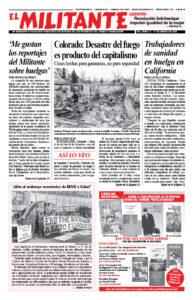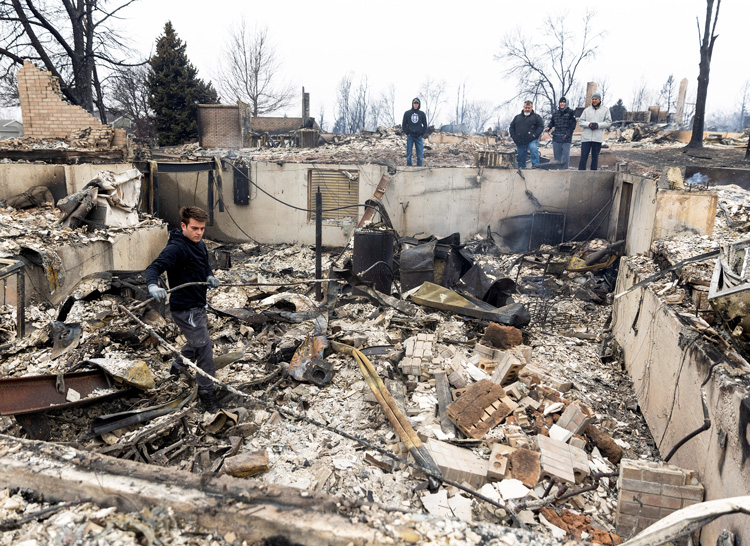WESTMINSTER, Colo. — By the end of the day Dec. 30 nearly 1,000 homes and businesses had been burned to the ground in Superior and Louisville, Colorado, leaving thousands homeless and two Denver suburbs in ruin. Nearby towns, like here where I live, were threatened, but escaped.
The Marshall Fire burned 6,219 acres in less than 12 hours, whipped ever forward by 100 mph winds. More than 35,000 people were under emergency evacuation orders as the fire jumped house to house — and across highways — at incredible speeds. Two people are missing and presumed dead. This is the worst wildfire in Colorado history.
Kent Crawford, 75, was working from his townhome when the fire broke out. He fled, trying to find a safe place to ride things out, but instead watched flames engulf building after building, home after home. “It was like a bombed-out war zone,” Crawford said. “The sun was obscured by the smoke. The smell. It was surreal.”
The misery facing working people was exacerbated when the fire was followed by 10 inches of snow and single-digit freezing temperatures.
Thousands whose homes weren’t leveled were left without heat and power, and faced bursting water pipes. Some 170 people sought warmth and a bed in a hastily opened shelter and many more were housed by family, friends and volunteers.
While the cause of the fire is still under investigation, politicians and the media are already looking for a scapegoat, talking up a report of a shed fire in the housing complex of a group called The Twelve Tribes, a Christian religious sect. Their aim is to shift blame to a small group as opposed to the dog-eat-dog capitalist system that makes housing a question of profits not people’s needs.
There was no government plan for such a disaster. All people in the area got was an order to evacuate, with no place to go. Roadways became clogged, endangering ever more in traffic jams in small neighborhoods. You and your family were left on your own to find a way out and find shelter and food.
Some working people came forward to try and fill in the vacuum. Stacy Howard, a school teacher, offered a room in her home over Facebook, saying her family was fine, but her “community was broken.”
Many people came out to try to help fight fires and save homes, with little success.
Examples of working-class solidarity shone through. When the fire was over, post office workers and letter carriers from surrounding areas volunteered to come in and set up ways for people to get letters, mail-order prescriptions and late Christmas presents. They cleaned up the Louisville Post Office Sunday, Jan. 2, and built a series of 15 cardboard holding cases, each with 70 numbered slots for those whose houses no longer existed. Others got in trucks and drove out to deliver the mail to homes still standing.
“The least I can do is making sure that getting their mail — and especially the important things that come — is organized and is not an additional burden,” letter carrier Wes Maynard told the Colorado Sun.
Housing for profits, not people
Housing, especially for workers, is in short supply in this growing area northwest of Denver. Over the last decade Louisville’s population grew by 15.5%. Builders and landlords see profits to be made, and aim to cash in. Colorado faces severe droughts. Rivers throughout the state are at historic lows, leading to government cuts in access to water rights in the area, with many farmers and ranchers facing catastrophic consequences.
These dry conditions, combined with a hurricane-force windstorm, fueled the fire. But the devastating impact was avoidable. Liberal pundits and politicians say the culprit is “climate change,” but this isn’t why so many thousands are now faced without a place to live.
That is due to the workings of capitalism.
The Marshall Fire may have spread because of the extreme dry conditions, but the devastation was caused by a system that doesn’t prioritize building housing with fire-resistant materials and enough space between units to mitigate the dangers of living in fire-prone areas. Housing is just a commodity on the capitalist stock exchanges and built to maximize profits.
Downtown Denver was burned to the ground in the Great Fire of 1863. Fueled by strong winds and an abundance of wood buildings, a small fire turned into a huge conflagration. Within three hours, almost every downtown building was leveled.
But building housing that can meet the intense fire risks of living in the high plains desert can be done. Immediately following the Great Fire, Denver began to rebuild, but this time nearly every building in the city was built with brick, not wood.
As I watched and waited for evacuation orders in my town, I knew what was happening around me could have been avoided. Today there exist stronger and much more effective fire-retardant construction materials. But to use them would cut into profits.
This was all the more evident the day after the fire when you looked around and the only thing left standing were stone fireplace chimneys.


